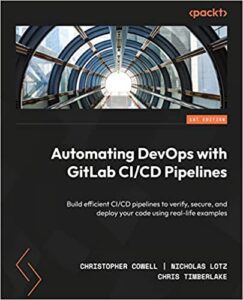Christopher Cowell is the author of Automating DevOps with GitLab CI/CD Pipelines, we got the chance to sit down with him and find out more about his experience of writing with Packt.
Q: What is/are your specialist tech area(s)?
Christopher: Technical training and QA
Q: How did you become an author for Packt? Tell us about your journey. What was your motivation for writing this book?
Christopher: Packt approached me directly, asking if I’d be interested in sharing my knowledge about GitLab. I researched the array of existing GitLab books and realized that none of them were up to date or written with beginners in mind. Since I had spent the previous year teaching hundreds of students how to use GitLab, I realized that I was in a perfect position to write a book that takes people from no knowledge at all to using the product to build, review, verify, secure, package, and deploy their code.
Q: What kind of research did you do, and how long did you spend researching before beginning the book?
Christopher: Most of the book was written off the top of my head, based on knowledge I’d picked up either from using GitLab or, more importantly, from explaining it to students in instructor-led classes. There were some topics that I needed to research by experimenting with GitLab, because I realized that I had never used them before. Other topics were beyond my range of expertise, so I called in two other co-workers to assist. In the end, one of them wrote two chapters, the other wrote three, and I wrote seven.
Q: Did you face any challenges during the writing process? How did you overcome them?
Christopher: The biggest challenge was dealing with the feeling of selfishness that comes from claiming the huge swaths of time that are necessary to write any book. Your family, friends, and hobbies suffer. I don’t have any magic bullet for dealing with this. You just ask people’s forgiveness, promise to make it up to them, and try to write as efficiently as possible.
Q: What’s your take on the technologies discussed in the book? Where do you see these technologies heading in the future?
Christopher: CI/CD pipelines, whether they’re driven by GitLab, GitHub, Circle CI, or any other products or services, are now absolutely considered a best practice for any software development team. They’re here, they work great, and the software industry is never going to give them up. I hope in the future AI will be able to take care of many of the configuration details that GitLab users currently have to manage. But that won’t happen tomorrow.
Q. Why should readers choose this book over others already on the market? How would you differentiate your book from its competition?
Christopher: This book is more current and is written in a clearer, more conversational style than any of the other GitLab-focused books I surveyed. All three of the authors of this book have been involved with creating and/or delivering official training classes offered by GitLab. No other book that I’m aware of has this pedigree.
Q. What are the key takeaways you want readers to come away from the book with?
Christopher: GitLab is incredibly powerful and non-scary to set up. Using it in its most basic form is trivially simple. That’s a great way to get started, and then you can ratchet up the power and complexity of your CI/CD pipelines as you get more familiar with the product and as your software development workflow gets more complicated. It scales wonderfully: the more effort you put in, the more benefits you get out.
Q. What advice would you give to readers learning tech? Do you have any top tips?
Christopher: Regardless of what technology you’re trying to learn, use every resource available. Read Packt books, read books from other publishers, read blog posts, mess around in the GUI or the command line, search Stack Overflow for answers to your questions, talk to experts at your company, go to user groups, watch YouTube videos. The more different ways the info comes in to your brain, the more likely it’ll stick there.
Q. How would you describe your author journey with Packt? Would you recommend Packt to aspiring authors?
Christopher: You can make the process feel less intimidating by thinking of a book as a long series of blog posts. If you break your content down into blog-sized pieces, it’s easier to get started and to keep chugging along. Once you’ve got words in place, you can edit them to make your work look and feel more like the book you might be imagining. Editing is always easier than writing.
Q. What is that one writing tip that you found most crucial and would like to share with aspiring authors?
Christopher: Every minute you spend organizing or outlining before you start writing pays off tenfold. Many people don’t find that stage of the work fun, but it’s crucial if you want your final work to be something that you’re proud of and not a slapdash collection of disconnected thoughts.
You can find Christopher’s book on Amazon by following this link: Please click here









